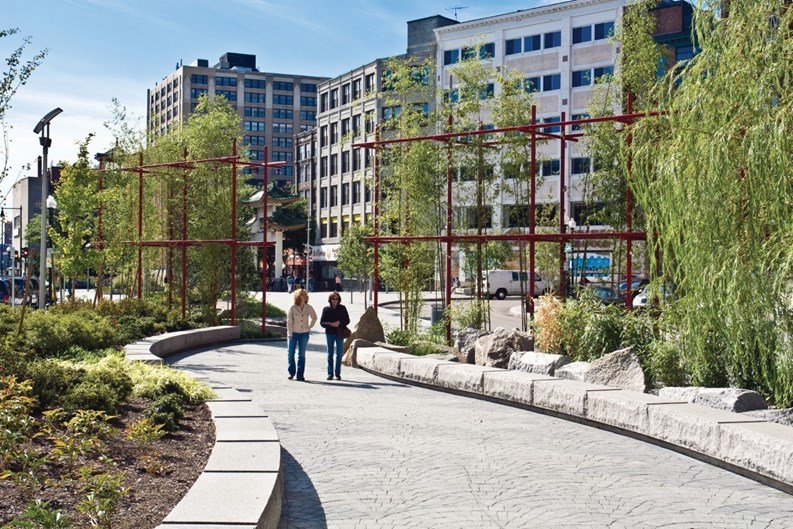After 15 tumultuous years of delays and construction costs that soared from $2.6 to $14.8 billion, Boston's "Big Dig" highway project officially came to an end at the stroke of midnight on December 31.
With the ubiquitous construction crews and their attendant dirt and grime now gone, the multiple legacies of the project are starting to take shape.
The legendary traffic that used to ensnarl the Central Artery (Boston's other Green Monster) has been rerouted underground, into a series of tunnels and roads that, so far, has kept traffic moving along I-93 and to Logan Airport.
Above ground, the Rose Fitzgerald Kennedy Greenway is coming into focus in the huge swath of Boston Harbor waterfront property once occupied by the now demolished Central Artery.
Named after the Kennedy family matriarch who grew up nearby, the mile-long Greenway – running from Bullfinch Triangle south to Chinatown – is best described as a diamond in the rough, a large stretch of parkland that has more potential than polish.
The Greenway has shown definite progress as two of its three major parks, in Chinatown and the North End, hosted modest ribbon-cutting ceremonies last year as part of a "soft opening" of the overall project.
Widespread Grumbling
But there also been widespread grumbling by locals about the pace of park development as the Greenway's third major park, in the Wharf District, has been pushed off until this spring, and major public facilities like The Harbor Park Pavilion have been subject to repeated delays.
Squarely in the middle of the optimism and grumbling is the Rose Kennedy Greenway Conservancy, a non-profit organization created in 2004with the goal of one day taking over operational control of the Greenway.
Conservancy Executive Director Nancy Brennan acknowledges that things have not moved along as fast as some expected, but says it's because her organization has yet to take over day to day operations of the Greenway. "The turnpike authority is still in control," says Brennan, referring to the Massachusetts Turnpike Authority, the owner of the land on which the Greenway sits. Negotiations are under way between the MTA and the Conservancy and Brennan says her group expects to take over operationalcontrol in the next six months.
"Boots on the Ground"
"We will have boots on the ground as soon as the Turnpike Authority gives us an operating agreement," says Brennan.
Also holding up progress on the scheduling of events is the need to allow the new surface plantings time to mature, without the danger of being trampled by foot traffic, she says. "It's wise to be patient because the most important thing with a park is to have the plants and lawn stable," says Brennan.
By this spring, Brennan says, all the plants on the Greenway will have at least two growing seasons in, and the lawn areas can then tolerate more use.
Inaugural in Works
While looking forward to taking over operational control shortly, the Conservancy has not been sitting idle. It has raised $20 million and is planning a number of programs for 2008, including a grand inaugural this fall that would include all three parks.
"We have done a number of public programs. We are planning for the next big program which is the inaugural celebration, which will be up and down the Greenway this October. We've been working on educational programs along the themes of horticulture, life science and history," says Brennan, who notes a series of walking tours led by Bostonby Foot will start this spring.
While the 2008 schedule is currently being hammered out behind closed doors, Brennan says the Conservancy cannot publicly announce any specific events (excluding the inaugural) until the transfer takes place. However, Brennan can say that events being looked at include outdoor movies on jumbotrons, picnics, concerts and large civic celebrations of 5,000 people – allof them free and open to the public.
Progress on Facilities
Brennan says that progress is also being made on four public facilities -- The Harbor Parks Pavilion visitor center near Long Wharf, a new YMCA community center close to the North End, The New Center for Arts and Culture adjacent to Rowes Wharf and The Boston Museum Project near Faneuil Hall.
After earlier abandoning its project, the Greater Boston YMCA has started moving forward again on its North End Community Center, says Brennan, andthe delayed Boston Museum Project is busy fundraising and working with an architect on a design.
A winter garden planned by the Massachusetts Horticultural Society has been dropped by that group, but Brennan says the Conservancy will take over and develop the parcel itself as parklands. After a series of setbacks, the Harbor Parks Pavilion, is reportedly being redesigned on a smaller scale to reflect a disappointing fundraising effort from the private sector. It is not expectedto open until 2009 at the earliest.
Slowing the progress on all the deferred projects is a difficult financial environment, says Brennan. "The financial climate is just nervous right now between the housing crunch, WallStreet and whatever." But despite the slowdown, Brennan insists "there is plenty of money in Boston to get behind these projects. Each of the projects is really confident that they will be ready to raise money."
This year, says Brennan, will be marked by wholesale progress on a number of fronts. "2008 will be the time that the Conservancy and others who work with us will be pursuing a whole series of enhancements, starting with those parcels that are incomplete."
"Finish Line in Sight"
Brennan says she understands the impatience of residents and businesses but counsels patience. "We've waited 15 years to have the Greenway. We canlook forward to a really wonderful place to live and work," she says. "The finish line is in sight."
Peter Gori, project manager with the Boston Redevelopment Authority, also sees substantial progress on the Greenway. "There is less noise, less hustle, less grit from the highway. It's a much more pleasant place to be," says Gori.
On warm days, Gori says, the Greenway is already getting considerable use. Many are enjoying its extensive benches, sitting and reading a newspaper, sipping on a cup of coffee or brown bagging their lunch, he says. Pedestrian traffic has also increased dramatically, especially to the North End, which is seeing its largest volumeever, says Gori.
Fueling the pedestrian traffic – and adding energy and vitality to the Greenway – is the re-connection of about a dozen roads that were bisected when the Central Artery was built in the late 1950s. Reconnected roads like Hanover Street, State Street, Essex Street, Kneeland Street, Summer Street and Congress Street are all now huge conduits for pedestrians that enrich both the Greenway and its adjacent districts, says Gori.
Spurred by increased pedestrian traffic and a great setting, existing business are setting up cafes and new entrances on the Greenway in place of the loading docks and grimy back doors they used to maintain, says Gori. "Some of these buildings have new entrances – they're investing in their entrances on the Greenway side. So now they often have two or three entrances – and this [the Greenway entrance] is not a back door. It's another front door."
A whole series of North End restaurants – like Mother Anna's, Goody Glover's and Joe Tecce's Ristorante – have all now put in new outdoor seating in the formerly tight spaces that used to face the elevated highway, says Gori. And Tia's Restaurant by the Marriott Long Wharf, which has had outdoor dining facing Boston Harbor for years, has extended its café to face the Greenway, he says.
New Opportunities
Adding to the mix are a growing number of new businesses and residences that are eager to take advantage of the opportunities that the Greenway offers, says Gori. New businesses include Panera Bread on High Street and Greenway Place on State Street, a mixed-use development featuring commercial space and luxury loft-style condominiums.
Other large residential mid-rises directly on the Greenway are under construction or recently finished, Gori days. The Residences at the Inter-continental at 500 Atlantic Avenue Street has been up and running for a few years, while right next door, the 31-story Russia Wharf Condominiums is currently under construction, he says.
Surveying the economic activity already underway in the Greenway, Brennan says the district has the potential to be an economic engine that can bring in substantial sums of money to the city.
Brennan compares her organization to New York City's Central Park Conservancy, and says Boston will someday have the ability to put on events similar to the "The Gates Project" in Central Park, a 2005 blockbuster art installation featuring 7,500 orange gates that flowed through the Frederick Olmsted-designed park.
"That was something that brought New York so much money, in terms of hotels and new customers to restaurantsin the middle of the winter," she says. "This Conservancy can absolutely over time grow into that kind of event-making crowd-generating organization, she says. "This [the Greenway] is going to be the place to be in the city," she vows.







Leave a Comment